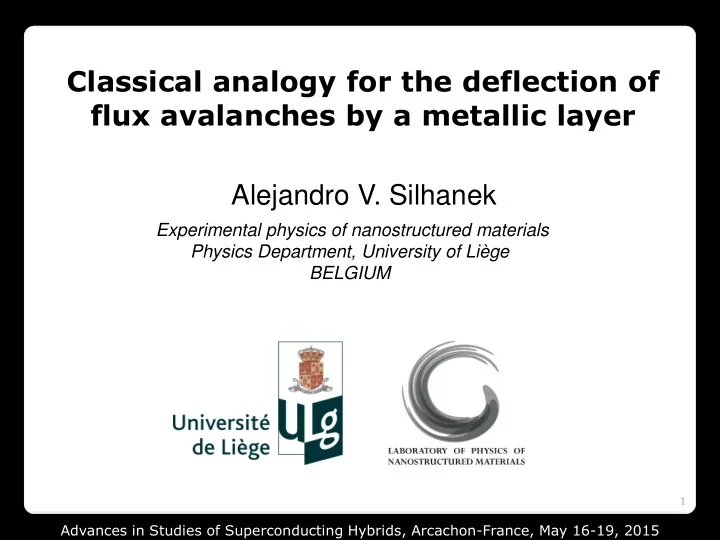

Classical analogy for the deflection of flux avalanches by a metallic layer Alejandro V. Silhanek Experimental physics of nanostructured materials Physics Department, University of Liège BELGIUM 1 Advances in Studies of Superconducting Hybrids, Arcachon-France, May 16-19, 2015
Collaborators J Brisbois, O-A Adami, J. Avila, B Vanderheyden, N D Nguyen Université de Liège, BE F Colauto, M Motta, W A Ortiz, Universidade Federal de Saõ Carlos, BR J Van de Vondel, V V Moshchalkov, KULeuven, BE 2
Magnetic flux avalanches D M >> D T D T >> D M Q Adiabatic conditions, Δ T = Q / C (T) Flux T motion v >10 km/s > sound velocity 3 km/s v Abrikosov << 1 km/ s v kinematics ~ 1-10 km/ s Jc, F p 3 R. G. Mints and A. L. Rakhmanov, Rev. Mod. Phys. 53 , 551 (1981)
Cu coating of superconducting wires Q Flux T motion Jc, F p Better stability by reducing the speed of penetration of the flux jump Thermal sink Quench protection 4 Harrison et al. , J. Low Temp. Phys. 18 , 1 (1975) | Larbalestier et al. , Nat. Mat. 13 , 375 (2014)
Magnetic braking of vortices in semiconductor/superconductor hybrids “significant additional damping of vortex motion caused by the eddy currents generated in the 2D electron gas” F D DEG 2 T SC 2 DEG SC v d n F D v 5 Danckwerts et al. (2000) Phys. Rev. Lett. 84, 3702 | Baker and Rojo (2001) Phys. Rev. B 64, 14513
Deflection of flux avalanches The gold capping reduces the velocity v of the avalanches. Change of propagation direction depending on the incident angle. 6 J Albrecht et al. (2005) Appl. Phys. Lett. 87 182501
Open questions Is there a refraction like behavior of avalanches ? Au Is the extra vortex damping produced by the metallic layer constant ? F D SC metal v Can a single vortex also undergo deflection when entering the region covered by the metallic layer ? Does the metallic layer influences the vortex flow at lower velocities ? 7
Avalanche exclusion No thermal shunt at the nucleation point of the avalanches Exclusion of flux avalanches by the Cu layer In the smooth (critical state) flux penetration regime, there is no difference between the sample with or without the Cu triangle ZFC 2.5K, 20 Oe ZFC 7K, 15 Oe 8 Brisbois et al ., New Journal of Physics 16 (2014) 103003
Avalanche exclusion 9
Classical model 10 Brisbois et al ., New Journal of Physics 16 (2014) 103003
Eddy currents and image method A magnetic dipole suddenly appears over a conducting plane
Eddy currents and image method v D t w D t w
Classical model v w w Low velocity High velocity 13 T.D. Rossing and J.R. Hull, Phys. Teach. 29 552 (1991) | W.M.Saslow, Am J. Phys. 60 , 693 (1992)
Classical model 2 q w w 0 F D 1 2 16 z v 2 2 v w 0 ~0,1 km/s ~1 km/s F LO 1,0 2 v v 1 F D / F max v * 0,5 0,0 0 2 4 6 8 v / v * 14 Brisbois et al ., New Journal of Physics 16 , 103003 (2014) | W.M.Saslow, Am J. Phys. 60 , 693 (1992)
Boundary effect 1.0 0.8 Normalized F lat 0.6 0.4 0.2 0.0 -5 -4 -3 -2 -1 0 1 2 3 4 5 y/z 0 15 Borcherts R H and Davis L C 1972 J. Appl. Phys. 43 2418 | Davis L C and Reitz J R 1971 J. Appl. Phys. 42 4119
Vortex trajectories 16 Brisbois et al ., New Journal of Physics 16 (2014) 103003
Damping of ratchet motion 17 Adami et al ., unpublished.
Conclusion We are able to explain in classical terms the deflection of magnetic flux by a conducting layer Our classical analogy suggests a non-monotonous F D ( v ) relation Typical MOI experiments need an Al mirror of about 100nm. Does this mirror influence the measurements? and the cold finger? The metallic layer affects the effective vortex ratchet Next step: what about replacing the Cu layer by a superconducting film? 18 Brisbois et al ., New Journal of Physics 16 (2014) 103003
Thank you 19
Recommend
More recommend